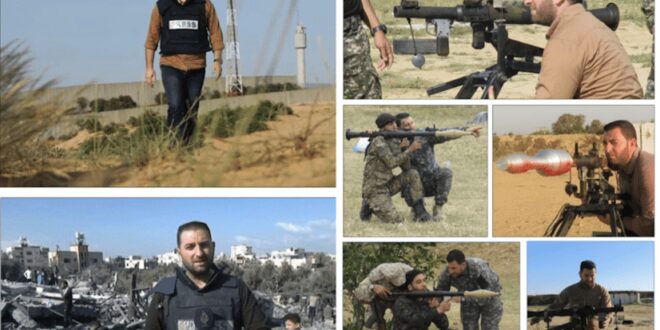The Qatar-owned channel Al Jazeera has unjustifiably become part of the Gaza war story.
In January, two Al Jazeera reporters, Hamzah Dahdouh and Mustafa Thurayya, were killed in the war. On Monday, the Israeli military freed Al Jazeera correspondent in Gaza Ismail Al-Ghoul, hours after arresting him during its renewed operations in the Al-Shifa medical compound.
Compared with other major networks, Al Jazeera has a higher number of casualties in the Gaza war, reflecting the extent of resources it is investing in its coverage.
But to what end is that coverage so intensive? Last month, Israel released pictures from the laptop of another Al Jazeera journalist, Muhamad Wishah, showing him supervising anti-tank missile training with Hamas.
Since the outbreak of the war on October 7, Al Jazeera has switched to non-stop live coverage of what it calls “the Israeli aggression on Gaza,” even though it was Hamas that started the carnage by massacring 1,200 Israelis.
And while Al Jazeera claims objectivity, its language gives away its bias – such as describing Palestinian or Lebanese deaths as “martyrs who were elevated” to heaven, while calling Israeli casualties merely “killed.” No other major Arab network uses the term martyr.
For a channel funded by a major non-NATO US ally, Qatar, Al Jazeera operates like the info-op tool of a state that is at war with the US – prompting Secretary of State Antony Blinken to ask his Qatari counterpart, on October 25, to tone down the channel’s aggressive language, to no avail.
Al Jazeera’s style guide about Israel is at odds with international law. The channel uses the term “settlement” to describe all Israeli towns, not only those in the disputed territories of 1967. It describes as “occupation” Israeli presence anywhere on the land, even inside the 1948 territory that is globally recognized as Israeli.
The Qatari channel has been broadcasting – without crosschecking for veracity – footage from Hamas and Islamic Jihad showing images of Israeli tanks or infantry in Gaza. A red triangle then is shown pointing out the Israeli target, after which Palestinians fire on it. The footage usually pauses just before the target is struck. Despite all the alleged strikes, pictures of burnt or destroyed Israeli tanks have yet to surface.
Retired Jordanian army general Fayez Al-Duwairi then spends hours daily standing in front of a big screen pointing at Gaza’s map, explaining Hamas footage and always concluding that the Gazan militants have been giving Israel a beating.
Duwairi’s failed predictions, including of Hamas repelling a ground Israeli invasion, have been piling up, but have not stopped him from becoming an Arab celebrity, so much so that when one Hamas fighter was video recording an attack on Israeli troops, the fighter was heard shouting “analyze this, O Duwairi!” The expression trended on Arab social media for days.
Like Qatar and Al Jazeera, Duwairi became the news. Al Jazeera asked him about his feelings when he heard Hamas call his name. “That call was a medal on my chest,” the former general said. “If I didn’t feel pride then, it’d have meant that I had given up on my pan-Arab nationalism.”
Debuting in 1996 as an Arabic satellite channel, Al Jazeera quickly won praise for its evenhanded coverage and professionalism – habits that it abandoned shortly after. Seeing in its channel a potent soft power tool, Doha has increased multifold Al Jazeera’s budget, now estimated at over US$1 billion a year, and added an English channel and a social media stream AJ+.
Long before the ongoing war in Gaza, Al Jazeera had been offering misinformation consistently.
For example, last Ramadan, when religious fervor was running high, Al Jazeera claimed that Israel prohibited Palestinians from praying at Al-Aqsa in Jerusalem, even when Palestinians reported that the number of those who prayed there reached a quarter of a million, at a shrine whose maximum capacity is supposed to be 180,000.
The channel took pride, for another example, in being the first to claim that Israel had bombed al-Ahli hospital, killing hundreds of Palestinians who were taking refuge in the facility’s yard.
As Western intelligence and media started showing that the hit was the result of errant Palestinian fire, and that the number of deaths was a fraction of what was reported, Al Jazeera moved on, without ever acknowledging or regretting its error – but rather doubling down on its narrative that it was Israel that was deluding the world about the attack.
That Al Jazeera deludes its audience with its misinformation and sensational broadcasts is its business. The US government is concerned, however, when Al Jazeera skirts American laws that force foreign entities to file under the Foreign Agent Registration Act (FARA).
Washington has already forced the operation and staff of Moscow’s Russia Today to file under FARA. Al Jazeera stood defiant, arguing that it was like the BBC – an independent organization that receives a governmental grant.
But the BBC’s budget – including the salaries of all of its staff — is posted publicly online. The firewall between the British government and the BBC is also clear.
Al Jazeera, meanwhile, conceals its enormous budget and the extent to which Doha influences its editorial policy. For one thing, we know that Al Jazeera, whose harsh criticism does not spare governments, has never criticized Qatar. On the contrary, Al Jazeera amplifies any gratitude, no matter how small, shown by anyone toward Qatar.
Al Jazeera is not interested in news. It is focused on shaping the narrative in ways that befit Doha’s agenda. And even though Qatar is a US ally, Al Jazeera’s editorial policy suggests otherwise. This would mean that Doha either reins in its channel’s inflammatory and instigative rhetoric or starts shopping for other allies.
 Eurasia Press & News
Eurasia Press & News




